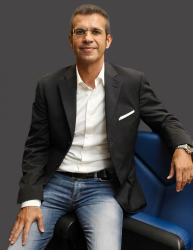Speaker: Prof. MASSA Andrea
Affiliation: ELEDIA@UniTN; ELEDIA@UESTC; ELEDIA@TSINGHUA; Tel Aviv University
Report Title: Inverse Problems in Electromagnetics ‐ Challenges and New Frontiers
Abstract:
Inverse problems arise when formulating and addressing many synthesis and sensing applications in modern electromagnetic engineering. Indeed, the objective of antenna design, microwave imaging, and radar remote sensing can be seen as that of retrieving a physical quantity (the shape of the radiating system, the dielectric profile of a device under test, the reflectivity of an area) starting from (either measured or “desired”) electromagnetic field data. Nevertheless, the solution of the well‐known theoretical features (including ill‐posedness, non‐uniqueness, ill‐conditioning, etc.) of electromagnetic inverse problems still represents a major challenge from the practical viewpoint. Indeed, developing and implementing robust, fast, effective, and general‐purpose techniques able to solve arbitrary electromagnetic inverse problem still represent a holy grail from the academic and industrial viewpoint. Accordingly, several ad‐hoc solutions (i.e., effective only for specific application domains) have been developed in the recent years.
In this framework, one of the most important research frontiers is the development of inversion techniques which enable the exploitation of both the information coming from the electromagnetic data and of that which is provided by prior knowledge of the scenario, application, or device of interest. Indeed, exploiting a‐priori information to regularize the problem formulation is known to be a key asset to reduce the drawbacks of inversion processes (i.e., the its ill‐posedness). However, properly introducing prior knowledge within an inversion technique is an extremely complex task, and suitable solutions are available only for specific classes of scenarios (e.g., comprising sparseness regularization terms). The aim of this talk is to provide a broad review of the current trends and objectives in the development of innovative inversion methodologies and algorithms. Towards this end, after a review of the literature on the topic, different classes of methodologies aimed at combining prior and acquired information (possibly in an iterative fashion) will be discussed, and guidelines on how to apply the arising strategies to different domains will be provided, along with numerical/experimental results. The open challenges and future trends of the research in this area will be discussed as well.
Biography:

Andrea Massa (IEEE Fellow, IET Fellow, Electromagnetic Academy Fellow) has been a Full Professor of Electromagnetic Fields @ University of Trento since 2005.
At present, Prof. Massa is the director of the network of federated laboratories "ELEDIA Research Center" located in Brunei, China, Czech, Ethiopia, France, Greece, Italy, Japan, Per Tunisia with more than 150 researchers. Moreover, he is holder of a Chang-Jiang Chair Professorship @ UESTC (Chengdu China), Visiting Research Professor @ University of Illinois at Chicago (Chicago - USA), Distinguished Visiting Professor @ Tsinghua (Beijing - China), Visiting Professor and IAS Distinguished Scholar @ Tel Aviv University (Tel Aviv Israel), and Professor @CentraleSupélec (Paris - France). He has been holder of a Senior DIGITEO Chair at L2S-CentraleSupélec and CEA LIST in Saclay (France), UC3M-Santander Chair of Excellence @ Universidad Carlos III de Madrid (Spain), Adjunct Professor at Penn State University (USA), Guest Professor @ UESTC (China), and Visiting Professor at the Missouri University of Science and Technology (USA), the Nagasaki University (Japan), the University of Paris Sud (France), the Kumamoto University (Japan), and the National University of Singapore (Singapore). He has been appointed IEEE AP-S Distinguished Lecturer (2016-2018) and served as Associate Editor of the "IEEE Transaction on Antennas and Propagation" (2011-2014).
His research activities are mainly concerned with inverse problems, antenna analysis/synthesis, radar systems and signal processing, cross-layer optimization and planning of wireless/RF systems, system-by-design and material-by-design (meta-materials and reconfigurable-materials), and theory/applications of optimization techniques to engineering problems (coms, medicine, and biology).
Prof. Massa published more than 900 scientific publications among which more than 350 on international journals (>17.000 citations, h-index = 69 [Scopus]; > 14.000 citations, h-index = 63 [ISI-WoS]; > 28.000 citations, h-index = 95 [Google Scholar]) and more than 570 in international conferences where he presented more than 210 invited contributions (> 50 invited keynote speaker) (www.eledia.org/publications). He has organized more than 100 scientific sessions in international conferences and has participated to several technological projects in the national and international framework with both national agencies and companies (18 international prj, > 5 M€; 8 national prj, > 5 M€; 10 local prj, > 2 M€; 63 industrial prj, > 10 M€; 6 university prj, > 300 K€).